Three days ago I departed from Pohang City on my bicycle and started riding north. My goal is to reach the Unification Observatory at the DMZ – the northernmost point in South Korea. When I began I faced a 400km / 250mi path ahead, but that distance had now been whittled down to 150km / 93mi.
You can read about the first days of my journey here: Day 1, Day 2, Day 3
Despite riding in February, I had great luck with the weather in my first three days. Temperatures were mild and I only needed a light sweatshirt for most of the ride. However, now on day 4, temperatures began to decline to usual winter temperatures. I wanted to ride as far as possible today because temperatures would continue falling overnight, and day five would be the coldest yet. Starting from the southern outskirts of Gangneung, I set my goal to reach central Sokcho city.
Riding to Downtown Gangneung
Immediately after waking up I could feel that today would be much colder than the previous days. Clouds covered the entire sky and a light fog blanketed the ground. Despite the change in weather I had no intentions of giving up. When you choose to take on a long distance bike trip in February you must be prepared for cold weather! When riding in winter my strategy is to bundle up in layers. On this morning I wore a thermal undershirt, a regular shirt, a hoodie, and a jacket. If the weather cooled further I had one more winter coat to add, so I felt prepared for the ride ahead.
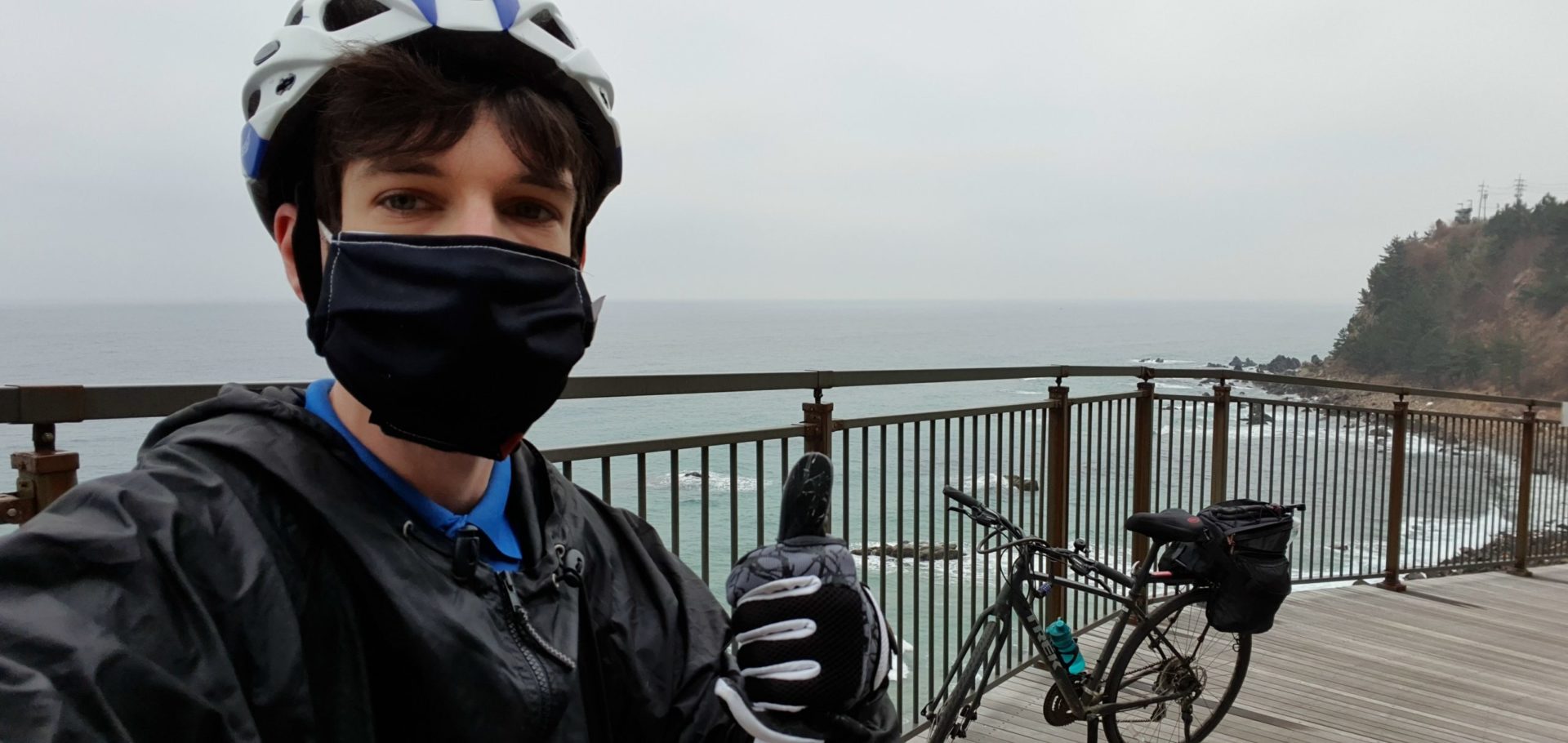

I left early in the morning so that I could reach downtown Gangneung by lunchtime. On my previous three days of riding I always stopped at a convenience store to pick up food for a picnic on the beach. However, because of the cold weather, I decided to stop at a restaurant in Gangneung for lunch. In order to get there I first followed some nice ocean views along some cliffs and passed by a museum built into a warship. After an hour or so along the coast, the bike path turns inland and rides through some flat farmland that leads into Gangneung. The further into the city I rode the more buildings popped up. Eventually the farmlands became scarce and the bustling city came into view.
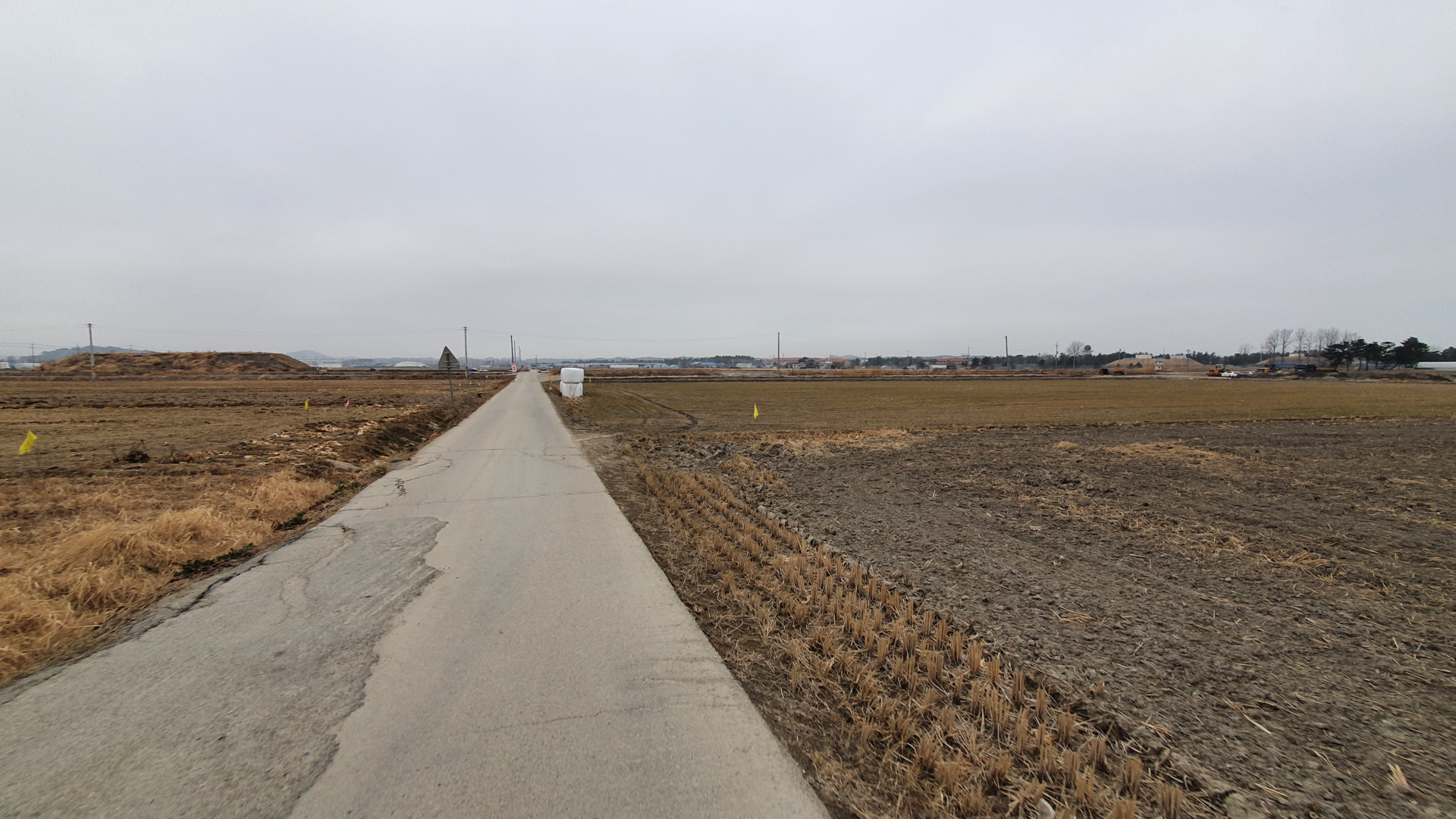
Lunch in Downtown Gangneung
Most big cities in Korea claim one food as their specialty. Gangneung claims a spicy tofu stew called sundubu jjigae (순두부 찌개). The best place to try this local specialty is the Chodang Sundubu Village – a street lined with restaurants that specialize in all kinds of tofu stews. Most places in Korea curdle their tofu with mineral or salt water, but the Chodang Sundubu Village sets itself apart by using seawater instead. This supposedly gives it a unique taste that you can’t find elsewhere in Korea.
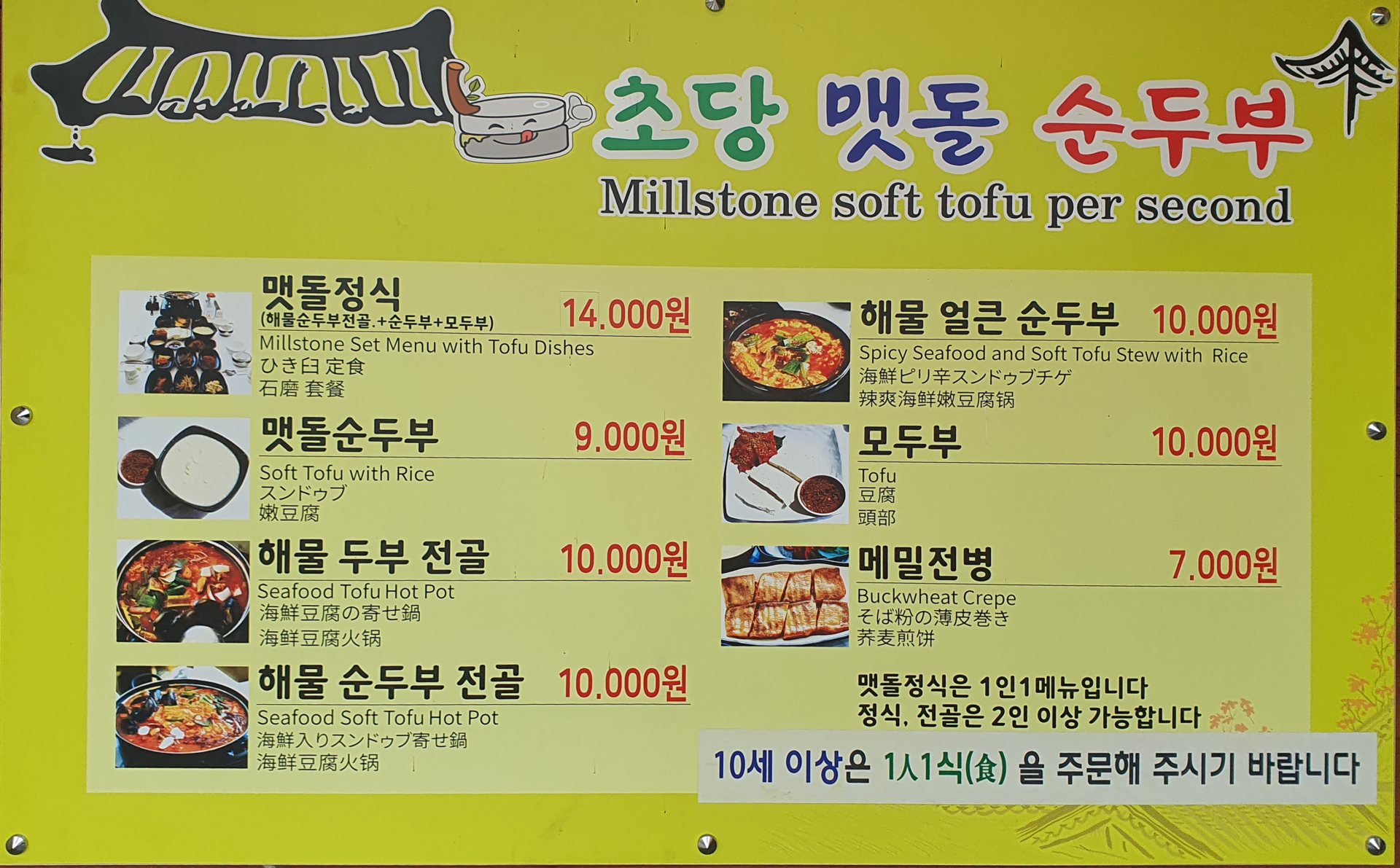
I arrived at the Tofu Village around 10:00 a.m., but crowds of people had already begun lining up to eat at the most popular restaurants. Usually when it comes to trying unique foods in new places my strategy is to pick the one with the most locals waiting in line. However, knowing that I still had a long distance to cover on the bike, I opted to eat at a restaurant that I could get in right away. I settled for a big restaurant called “Millstone Soft Tofu Per Second”. The name in English sounds funny because it is the result of a mistranslation from plugging the Korean name into a translation app. “Chodang” gets translated to “per second”, but really this is just the name of the Village itself and shouldn’t be translated.
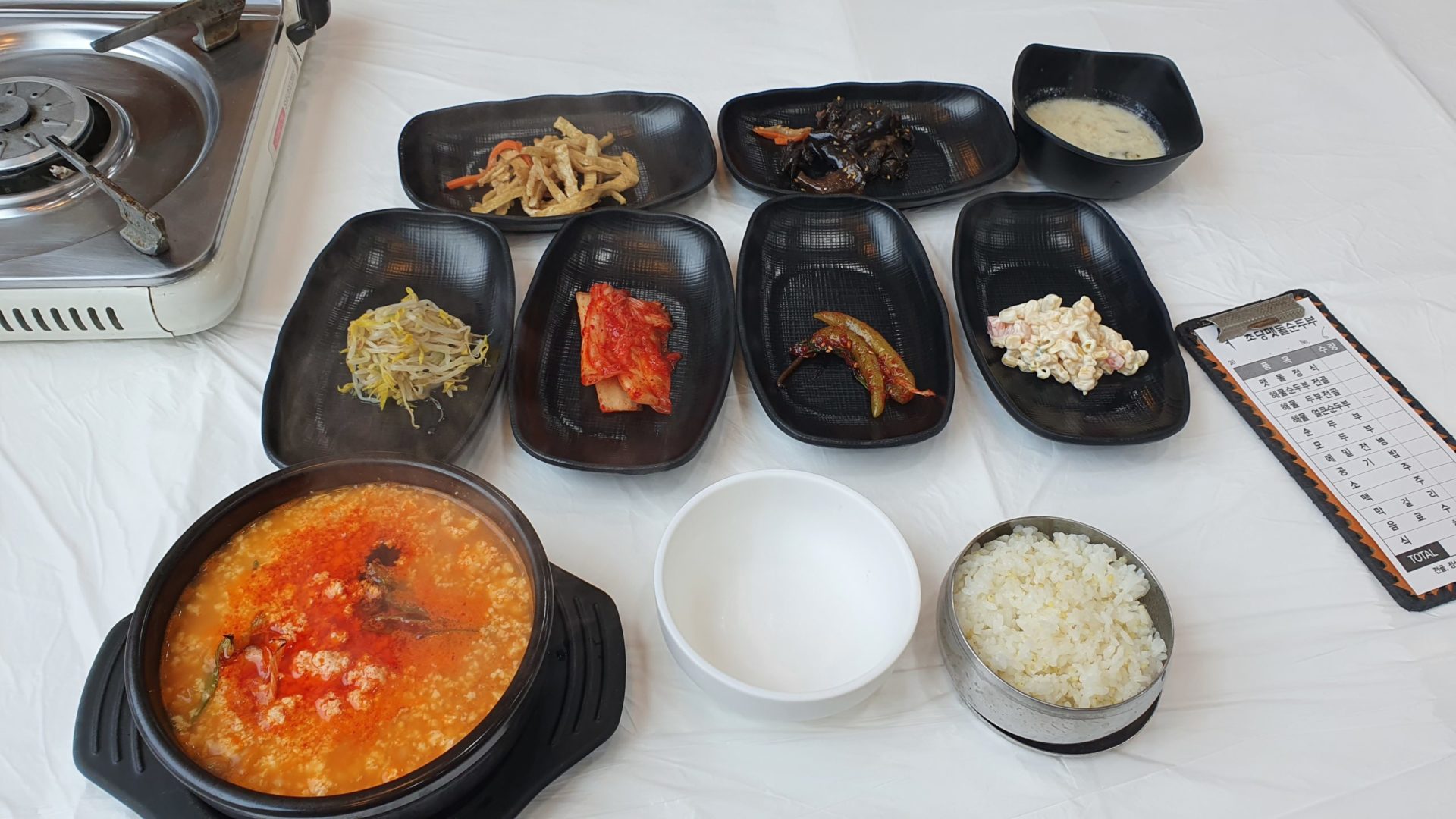
Spicy Korean soups are always a go-to choice for me on cold winter days, so I ordered the spicy seafood soft tofu stew. One of my favorite parts about eating at Korean restaurants is the number of side dishes served with the meals. These side dishes are called “banchan”, and you can usually ask for free refills! My soup was delicious, though to be honest I couldn’t tell the difference whether they used seawater or not!
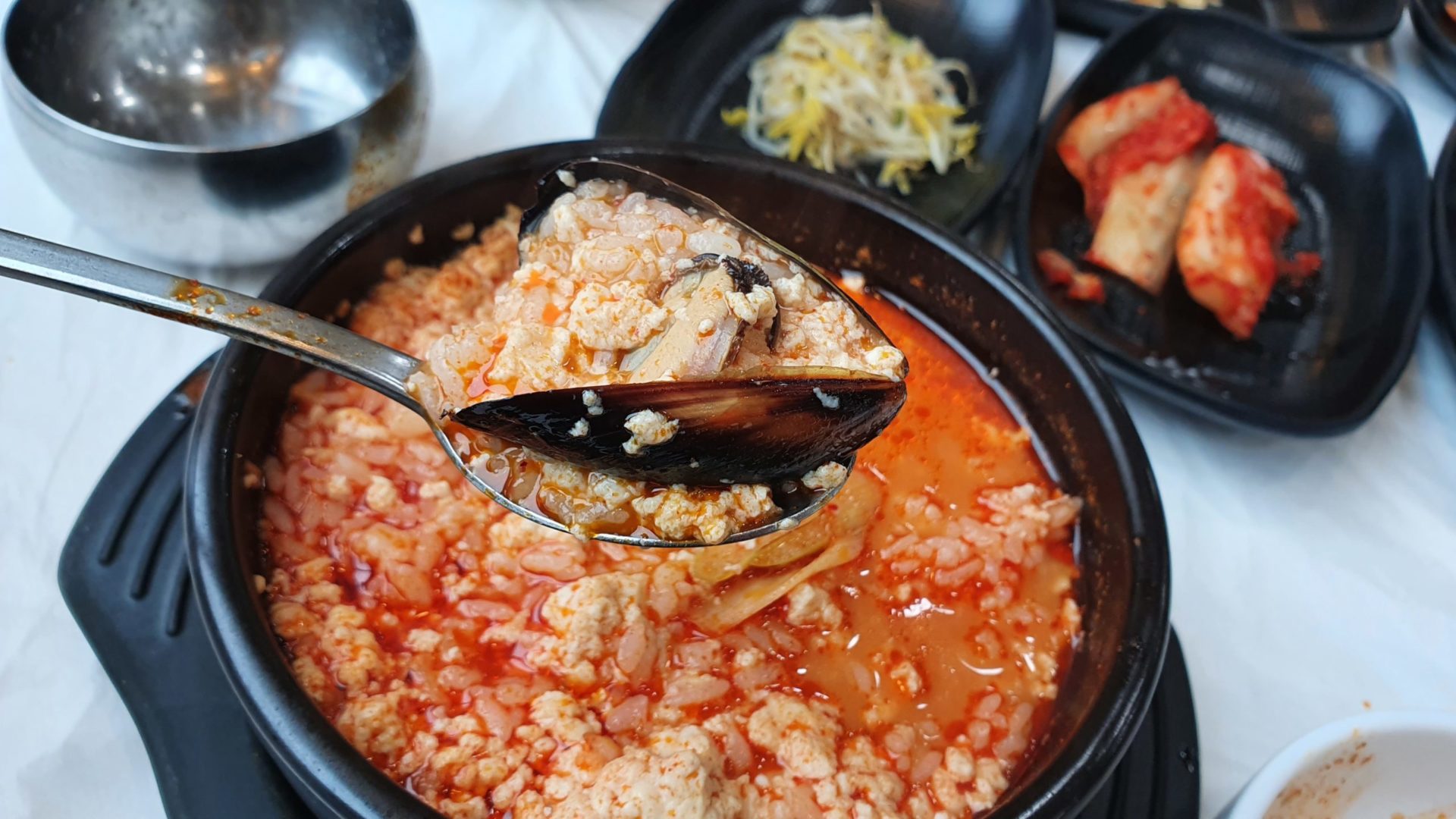
After warming up with the hot and spicy soup, I stopped at a place next door that serves tofu gelato. Whenever I hear of weird regional foods I always like to try them. You never know when things that sound horrible actually end up tasting good! Tofu gelato definitely surprised me. It’s actually pretty good, I would recommend anyone who visits Gangneung to try it.
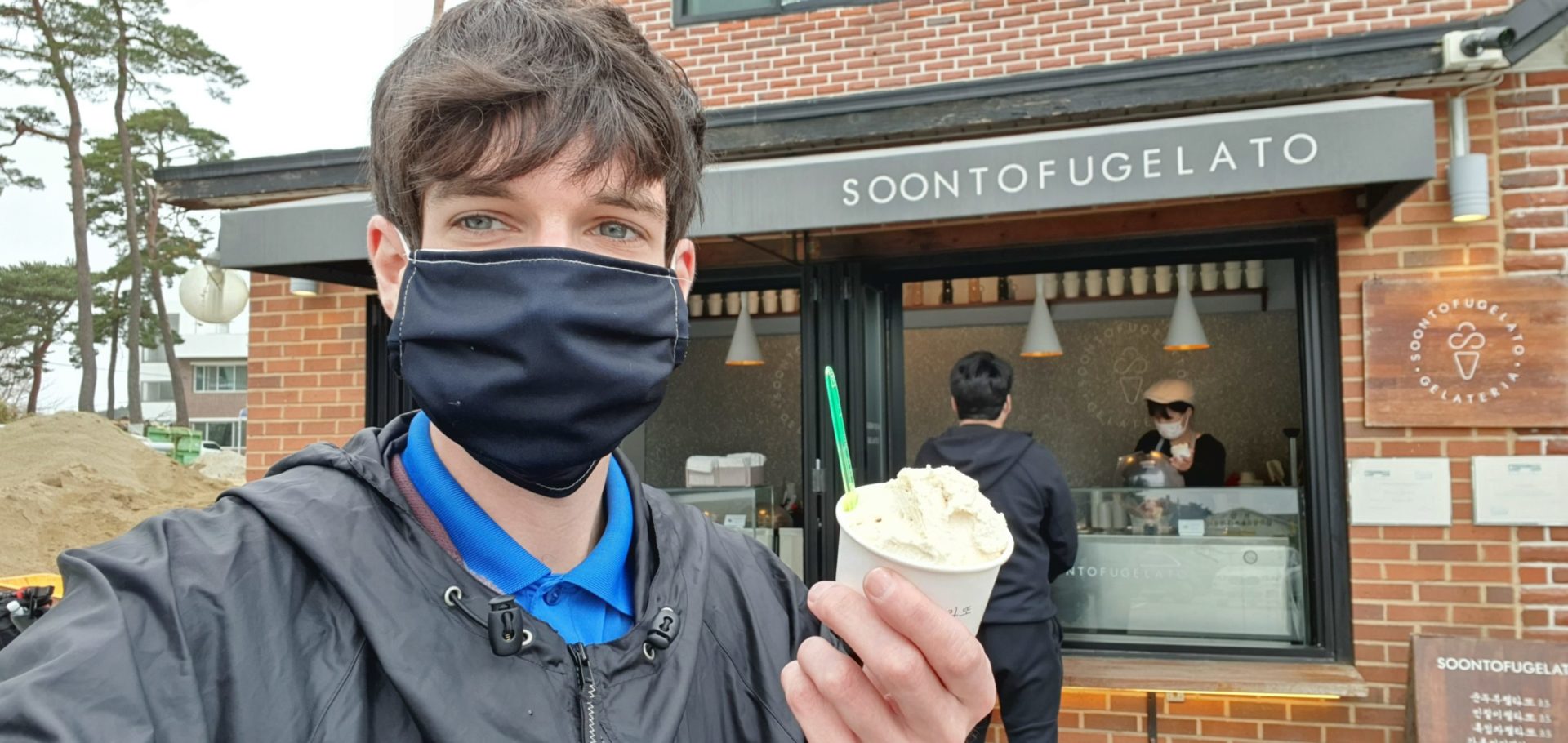
Gangneung to YangYang
After a satisfying meal and dessert, it was finally time to get back on the road. My lunch breaks the past few days didn’t take as long, so today I had a lot of ground to make up. Luckily I didn’t detour very far off the path to reach the Chodang Tofu Village, so I got back on the main path in no time.
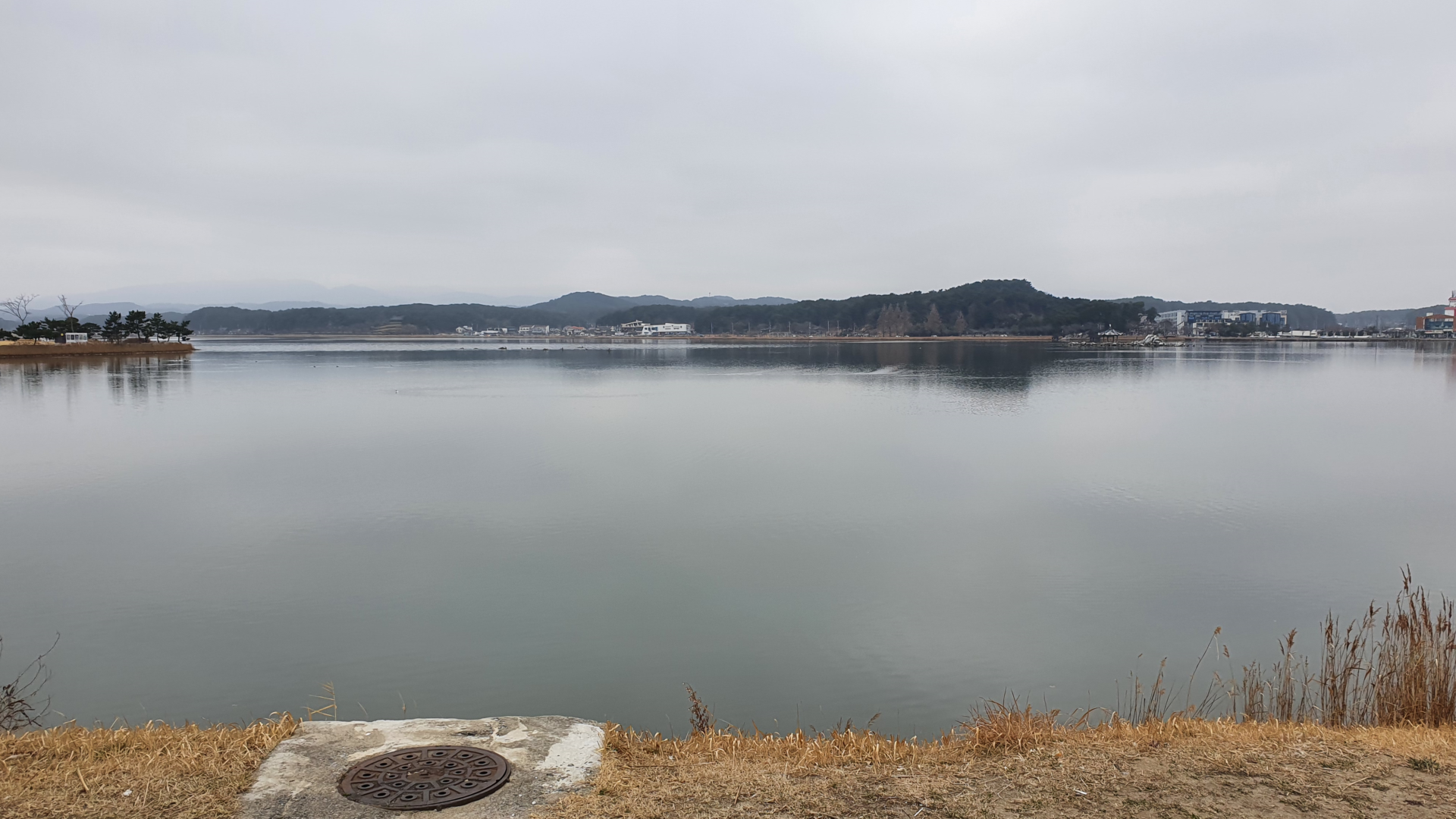
Throughout the entire trip I became so used to ocean views that seeing a body of water that isn’t the ocean came as a surprise. I didn’t realize it until writing this post, but the area around this lake and along the beach is actually a provincial park. The first stamp booth of the day is here, so I quickly stamped my book before getting back on the road. Daylight is limited this time of year, and I was already behind schedule due to my lunch break.
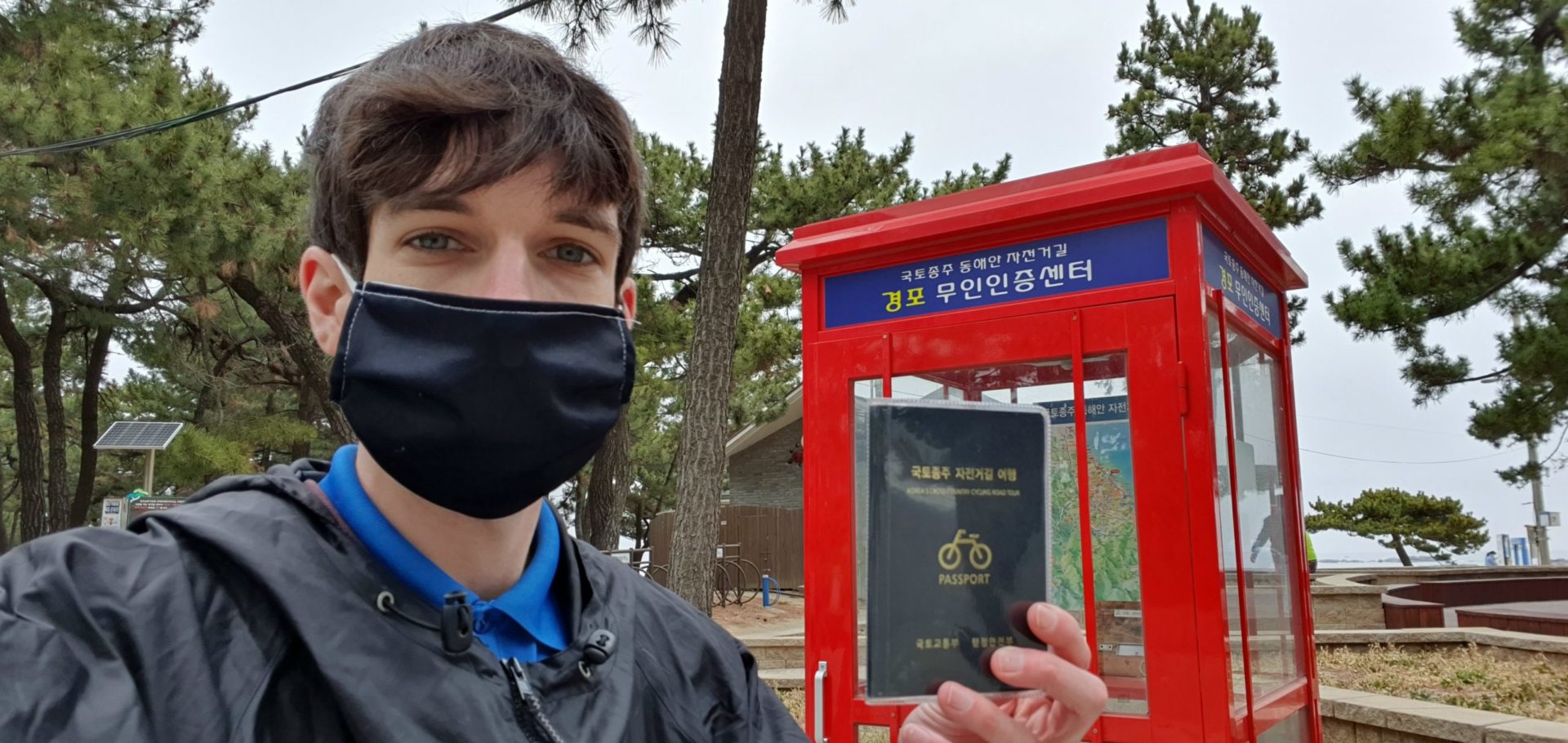
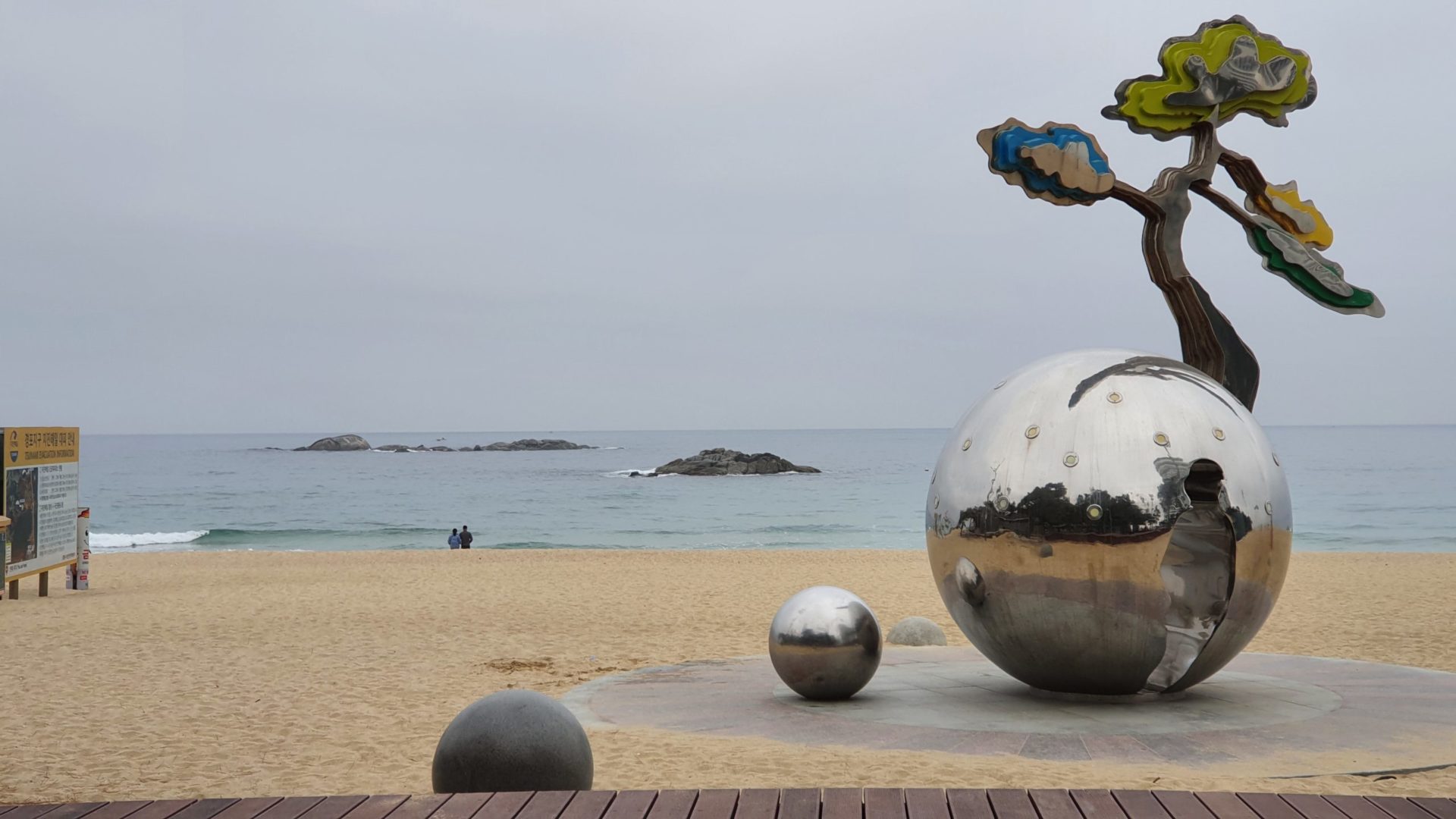
I didn’t take as many pictures this day as previous days due to the cold weather. My hands were freezing because I had to take off my gloves every time I wanted to take a picture with my phone. In addition, the ocean views didn’t look nearly as nice with the sun hidden behind overcast skies. Despite everything, I still had an enjoyable ride and saw some interesting views and nice beaches along the route.
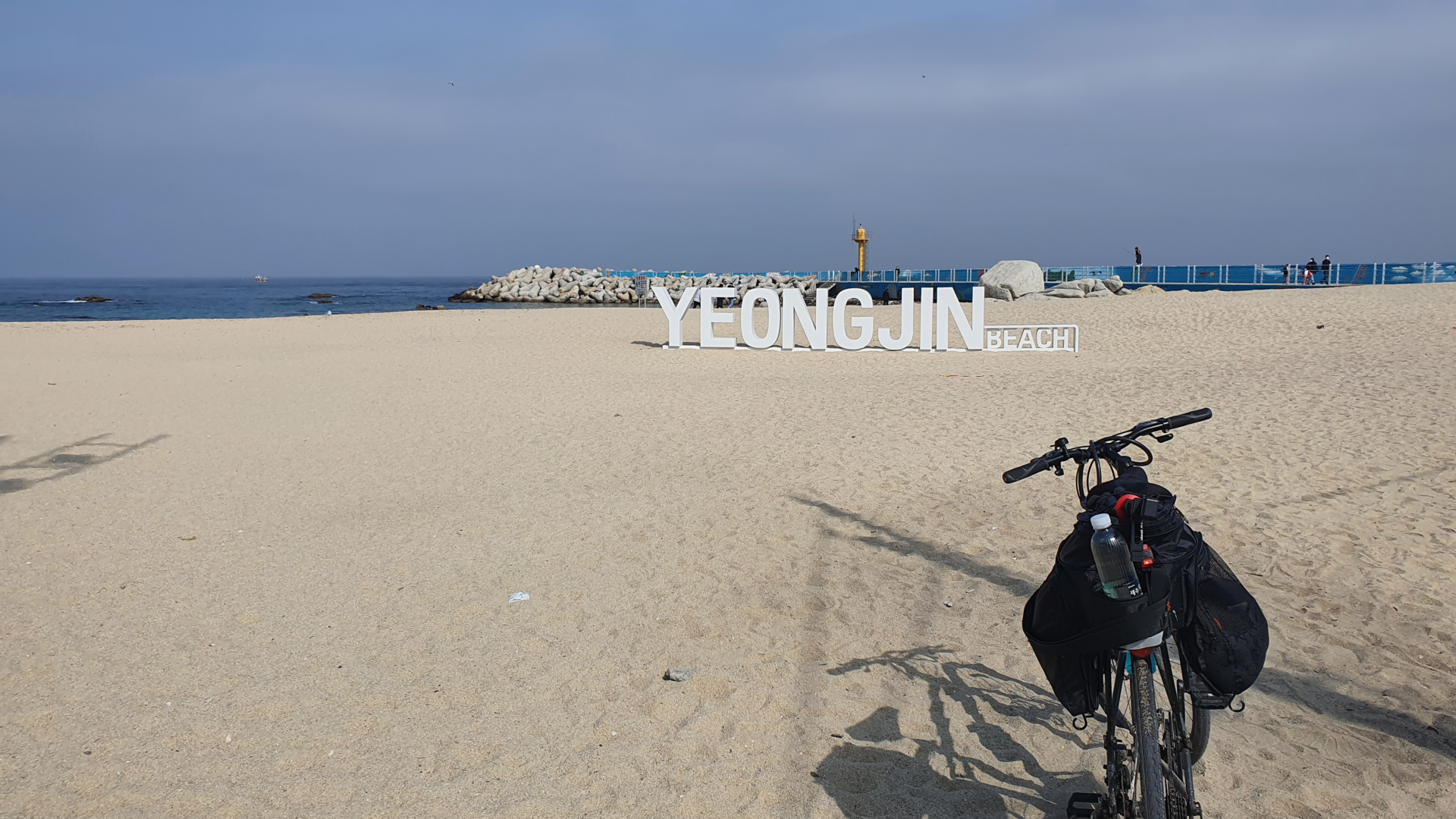
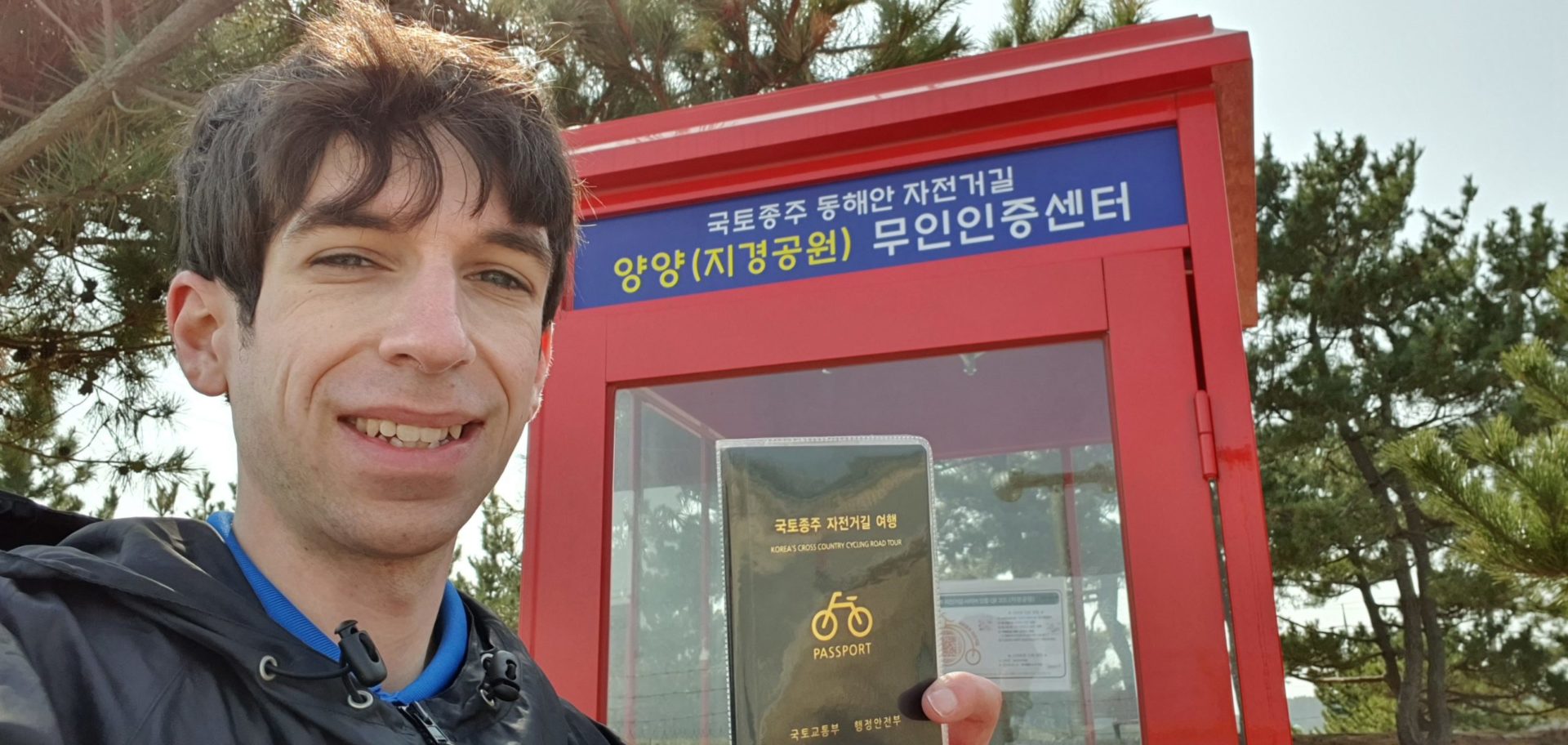
YangYang
YangYang County lies between Gangneung and Sokcho. While not as big as the two bordering cities, YangYang is notable because it is the location of a regional airport. This airport is convenient because it is close to both Gangneung and Sokcho. One section of the bike path even follows right alongside the airport. It must not be very busy during the Covid-19 pandemic because I didn’t see a single airplane take off or land.
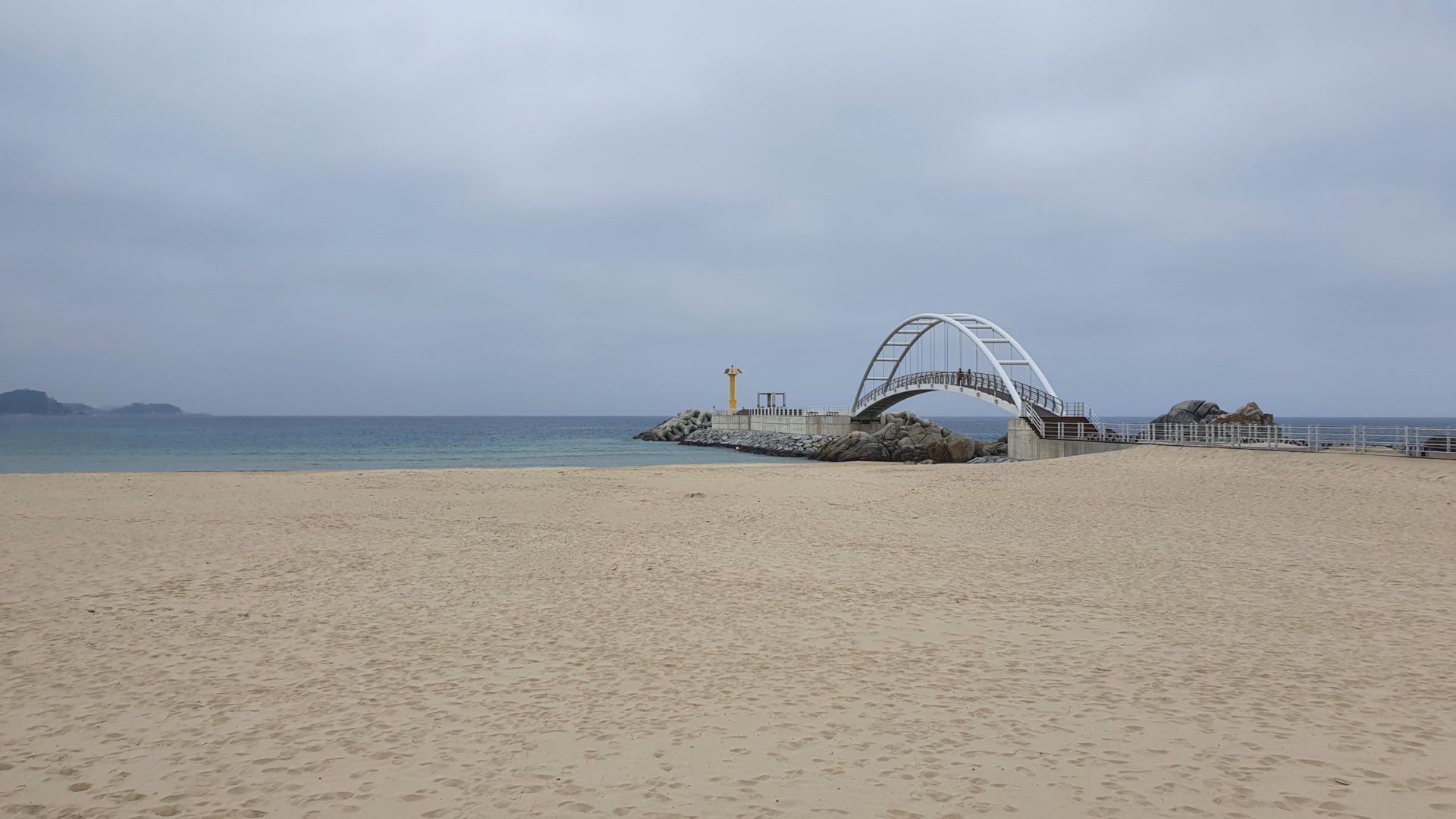

Bike Troubles
Shortly into my ride through YangYang, I noticed my back brake started to stick. Out of all of my bike adventures, I had never experienced any mechanical issues with my bike before. Thankfully I always bring extra tools to make any repairs necessary while on the go. Some of these bike paths can be pretty rural and I don’t want to be stuck walking the bike 10km to the nearest bike shop for repairs.

After investigating the issue, I realized the problem. A nut on my luggage rack had fallen out, making the entire luggage rack unstable. The support rod on that side now pushed against the brake, which applied pressure to it and made it stick. All I needed to do to fix it was to find a way to stabilize the loose support. However, I had a problem; I did not have any extra nuts and bolts in my repair kit. Instead I had to get creative with the tools I had available. By using a couple zip ties and tightening all the other supports, I managed to hold the luggage rack firmly in place. I figured this should last long enough until I could replace the nut and bolt when I arrive in Sokcho.

YangYang to Sokcho
While riding through YangYang I came to a sign that marked the 38th parallel, a line of great historical significance in Korea. Prior to the Korean war, this line marked the border between North and South Korea, splitting the Korean Peninsula in two. The border shifted around during the war, and the present day border is drawn a bit further north from here. Crossing this line felt significant because now I really felt like I had reached the far northern section of South Korea!
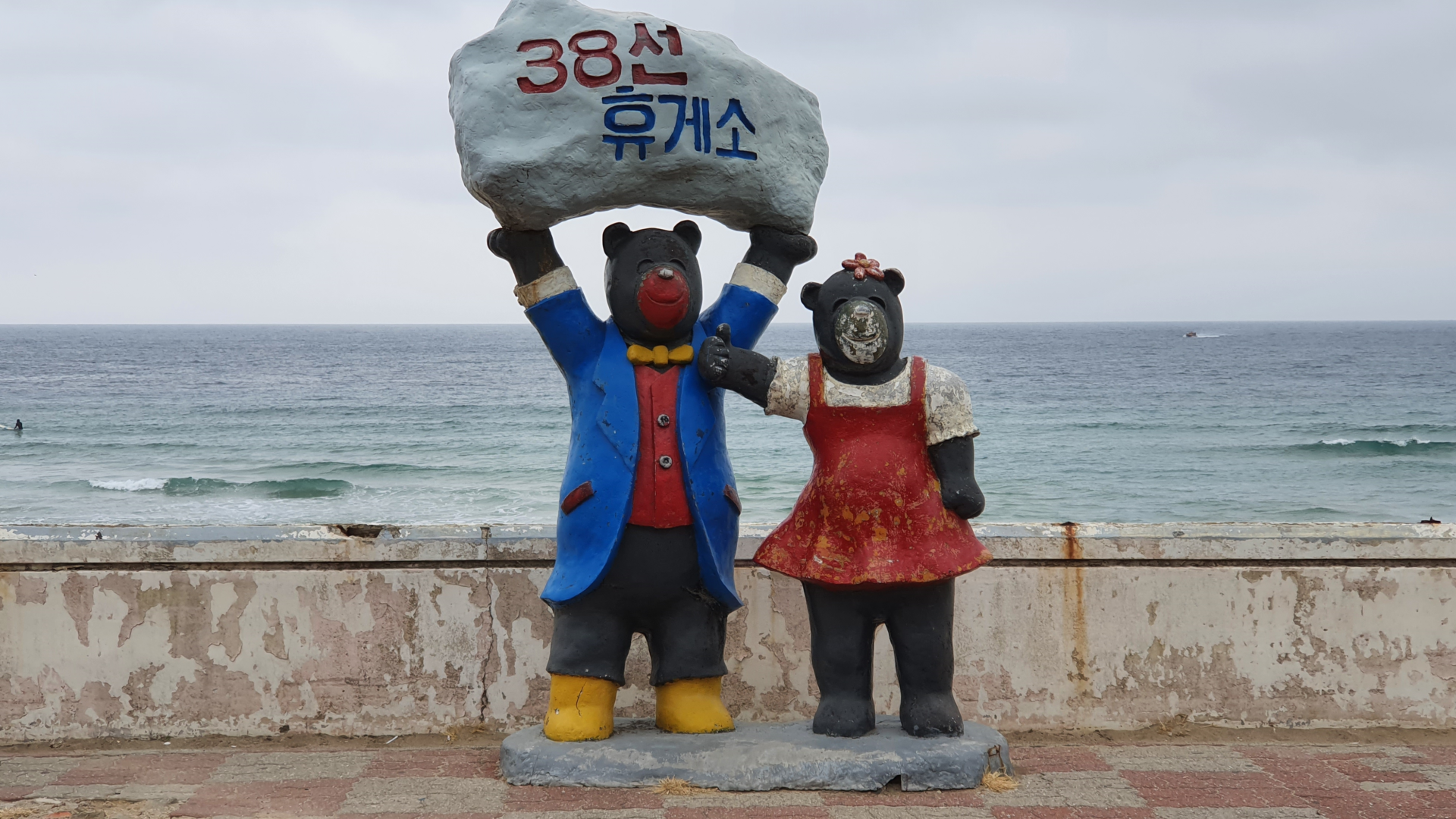
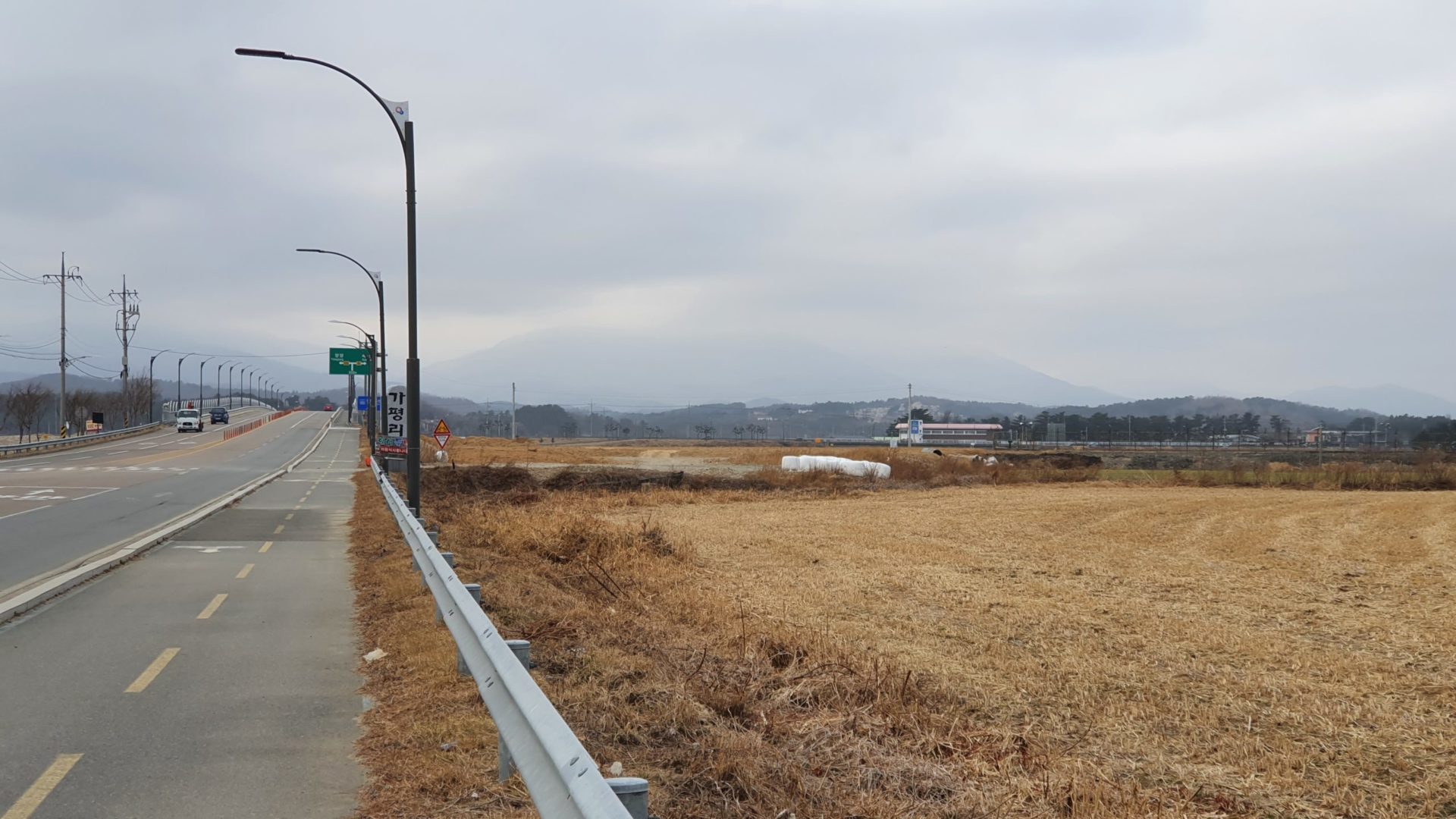
Sokcho
The final stretch of my ride once again proved to be the most difficult. As the day grew later the weather started to cool down even further and the wind picked up. However, in my mind I had already reached the point of no return. Sokcho was just one more hour of cycling away and I was determined to make it. I stopped at a convenience store for an energy bar to tide me over for the last stretch of road.

After what felt like hours, but was really just 30 minutes, I came to a view where I saw some big hotel resorts on the beach. I recognized these hotels from when I visited Sokcho just a month prior when I hiked Seoraksan in winter. Now that I had a better sense of direction, I knew that Seoraksan, the third tallest mountain in Korea, was just to my west. Unfortunately clouds obscured most of the view, but I still thought it was neat to look at the mountain and know that I stood at the peak not long ago.
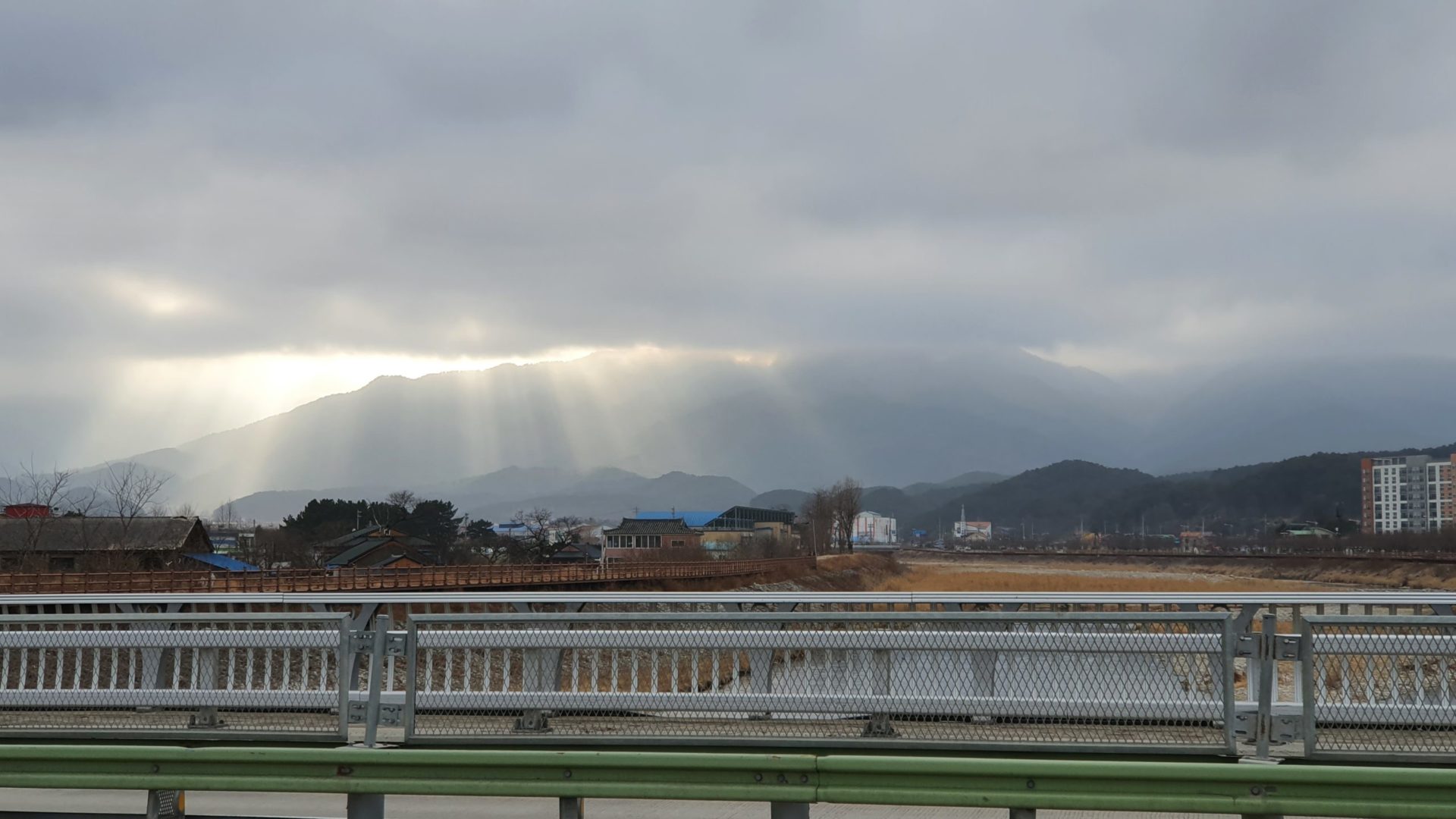
As I rolled into Sokcho city, the bike path followed along Sokcho Beach – another place I had explored when I last visited the city. I didn’t walk around for as long as I did last time. It was getting late and I was cold, hungry, and wanted to check into a hotel. However, I did have to take an obligatory picture with the bicycle at the Sokcho Beach sign to prove how far I had come. When I first started this ride four days ago I didn’t know if I would make it this far or not.
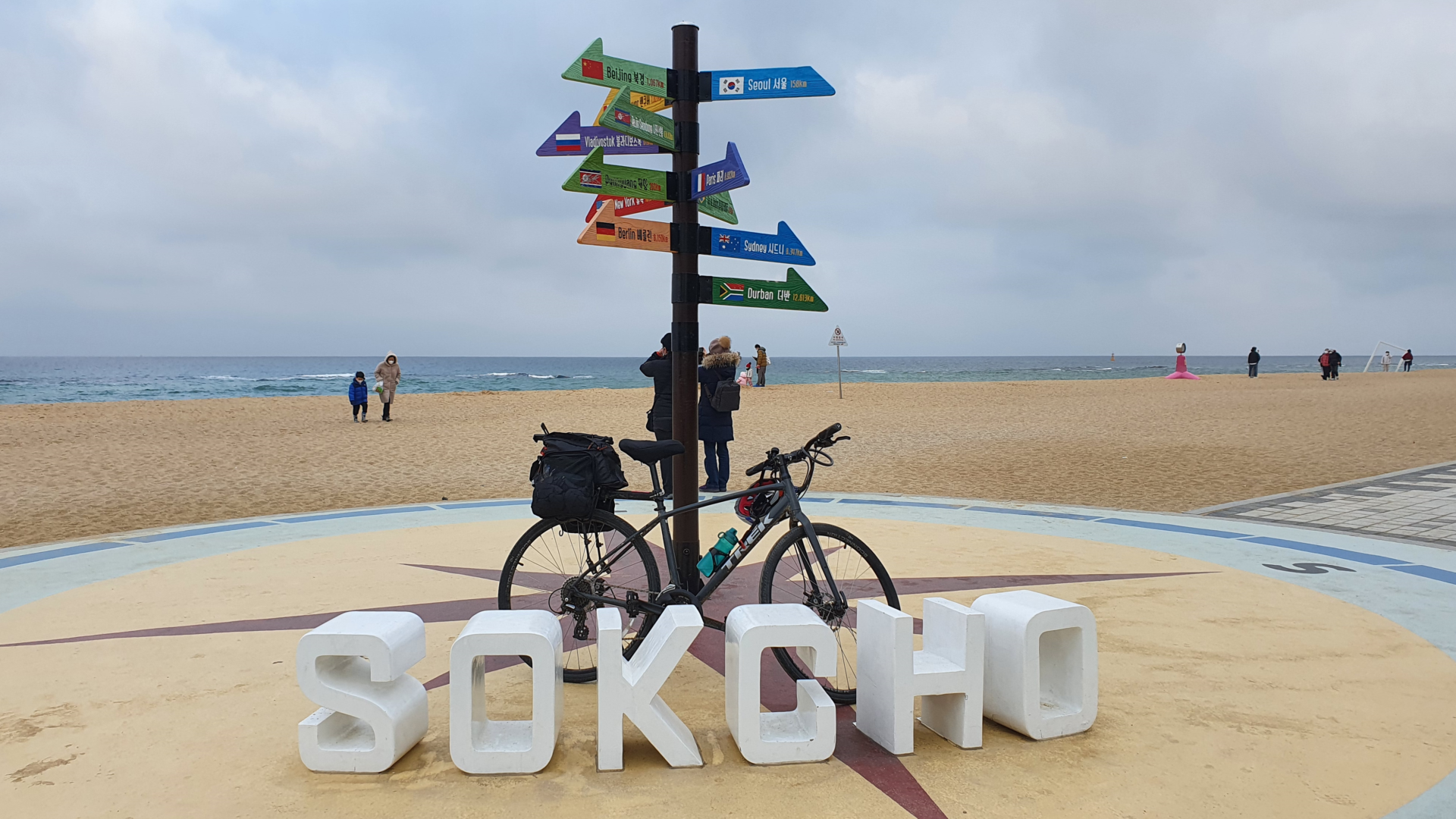
Hotel on Sokcho Beach
While on Sokcho Beach I started to look for a hotel to stay at somewhere in Sokcho City. I found the perfect place at Sokcho Harmony Pension (non-affiliate link). For only $35/night I had a nice room with a balcony right on the beach that I was already at!
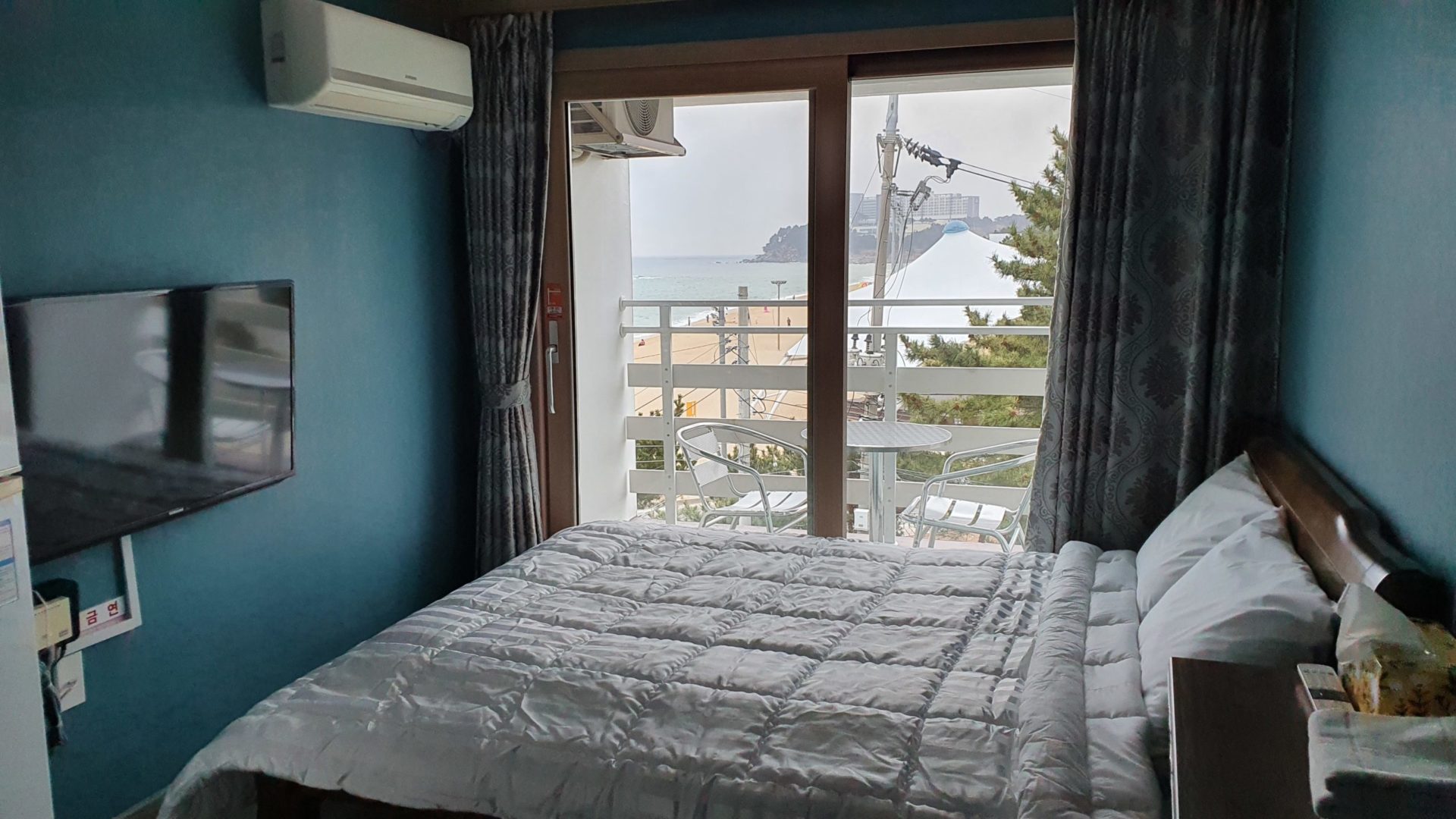
After dropping my bags in the room, I left to look for the closest convenience store. I was really hungry and didn’t want to wait for a slow restaurant. Along the way I found a GongCha, a popular bubble tea chain, so I stopped in for dessert. The first thing I noticed when walking into the café was a cat chilling at one of the tables. Are cats even allowed to be in a regular restaurant or café? Is this unsanitary? Do they need a permit for this? I’m not sure but I love cats so I enjoyed petting it while waiting for my tea.
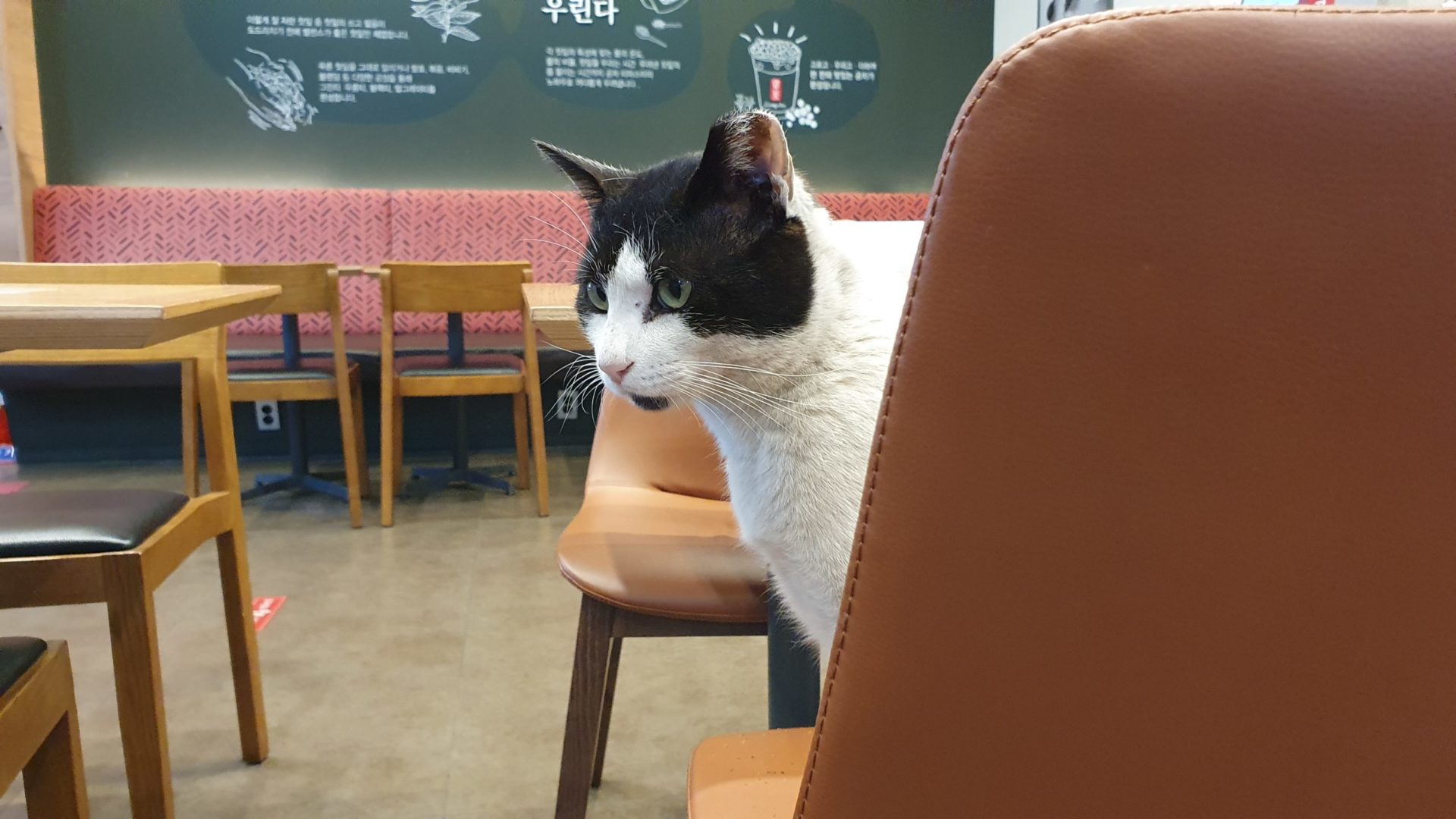
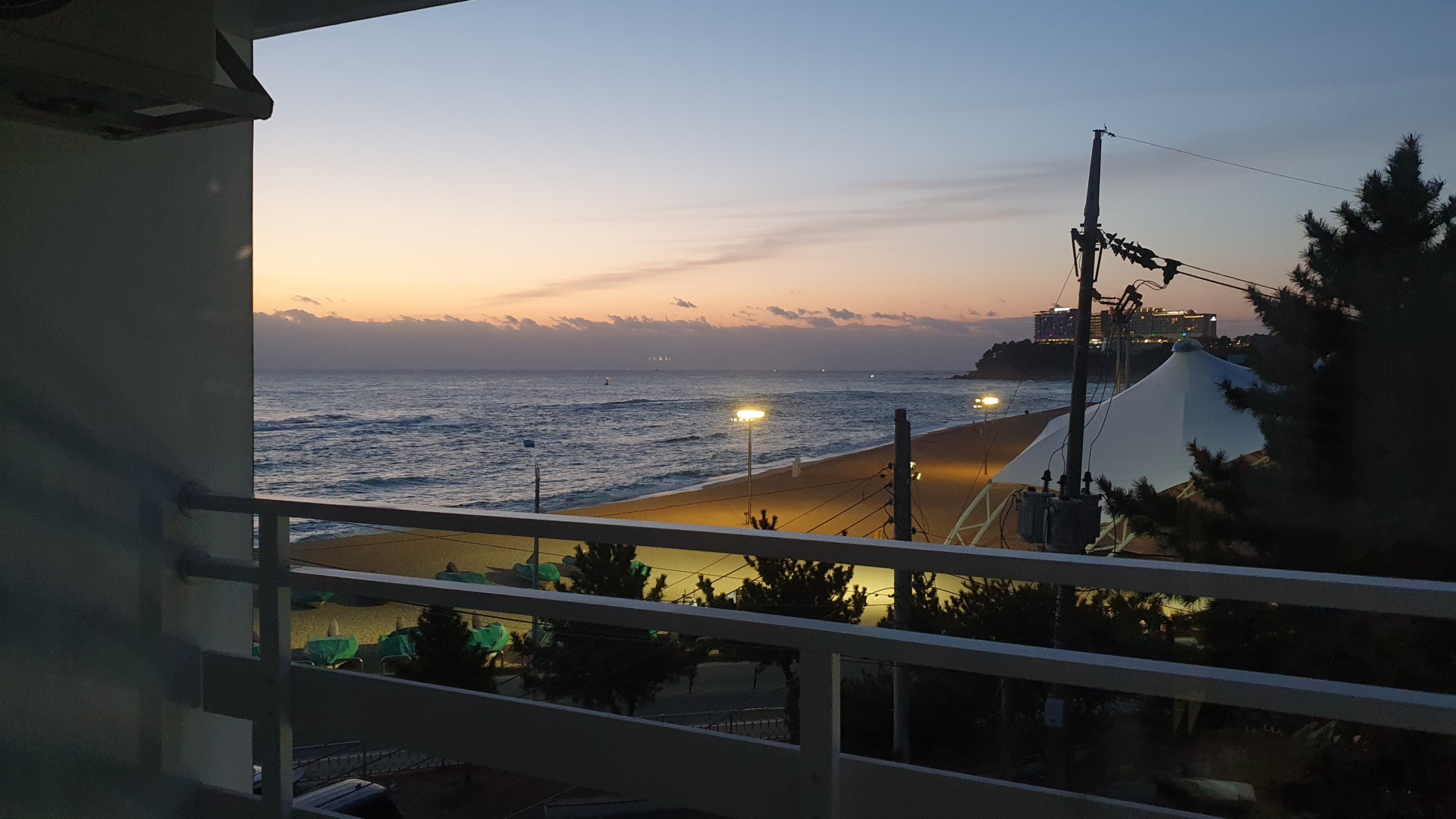
After day four I had traveled a total of about 350km / 217mi, leaving only 50km / 31mi until I reach the end of the road. Even though the weather forecasted even colder weather ahead, I knew I would be able to complete the entire thing. For now I just needed to get a good night’s sleep to be well rested for the final leg of the journey!
Continue reading about my Korea East Coast Bike Path journey:
Leave a Reply
You must be logged in to post a comment.